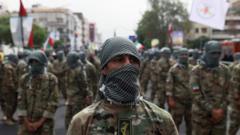Recent investigations reveal that the Iranian government has significantly escalated its efforts to target dissidents living abroad, utilizing criminal gangs for assassination and kidnapping operations as a means of evading responsibility and international backlash.
### Iran’s Covert Operations: Criminal Gangs as Tools for Overseas Targeted Attacks

### Iran’s Covert Operations: Criminal Gangs as Tools for Overseas Targeted Attacks
Iran's regime employs organized crime for international terror plots against dissidents, according to recent revelations from intelligence sources.
Iran's elite Revolutionary Guards are reportedly enlisting criminal networks to settle scores abroad, with alarming implications for dissidents in Europe and elsewhere. Evidence from court documents, obtained by investigative teams, reveals a disturbing trend of using organized crime as a veil for state-sponsored attacks, with connections to high-profile assassination attempts.
Western intelligence agencies have observed a surge in plots targeting dissidents, including journalists, political opponents, and activists, dating back to 2022. This alarming trend resonates globally and implicates the Iranian regime, with one of the prime suspects being Naji Sharifi Zindashti, a notorious Iranian crime figure. Zindashti has been linked to several murders and kidnappings that align dangerously with the Iranian state’s interests.
Documented incidents include the assassination of Saeed Karimian, a Persian TV network head, and the subsequent murder of defector Massoud Molavi, both of which allegedly involved Zindashti's coordinated efforts. His criminal operations have notably featured collaborations with global criminal organizations to execute Iran's extraterritorial directives.
Moreover, recent indictments suggest that the Revolutionary Guards' Quds Force is orchestrating activities with international criminal syndicates, such as the Thieves-in-Law, to fulfill its broader agenda of silencing dissent. The escalation implicates not just personal vendettas but also strategic state objectives aimed at destabilizing vocal opposition within Iran's diaspora.
Specifically, incidents of assassination attempts on high-profile individuals like Iranian-American activist Masih Alinejad appear orchestrated, with financial rewards offered for their elimination. This systematic targeting creates a chilling atmosphere for activists, journalists, and others who oppose the regime, highlighting a global security concern.
The U.S. and its allies, including the UK, have sought to address these threats through sanctions aimed at individuals tied to these operations, although Iran continues to deny any official connection to criminal elements used in these plots. With rising tensions, experts warn that criminal gangs could become increasingly instrumental in Iran’s foreign policy strategies aimed at countering perceived enemies.
In response to these developments, intelligence agencies globally are on high alert, with many fearing that Iran's actions may pose a growing risk to security and the safety of dissident communities across the world. As evidenced by recent arrests and ongoing investigations, the intersection of state-sponsored terror and organized crime presents a dire challenge to international safety and governance.
Western intelligence agencies have observed a surge in plots targeting dissidents, including journalists, political opponents, and activists, dating back to 2022. This alarming trend resonates globally and implicates the Iranian regime, with one of the prime suspects being Naji Sharifi Zindashti, a notorious Iranian crime figure. Zindashti has been linked to several murders and kidnappings that align dangerously with the Iranian state’s interests.
Documented incidents include the assassination of Saeed Karimian, a Persian TV network head, and the subsequent murder of defector Massoud Molavi, both of which allegedly involved Zindashti's coordinated efforts. His criminal operations have notably featured collaborations with global criminal organizations to execute Iran's extraterritorial directives.
Moreover, recent indictments suggest that the Revolutionary Guards' Quds Force is orchestrating activities with international criminal syndicates, such as the Thieves-in-Law, to fulfill its broader agenda of silencing dissent. The escalation implicates not just personal vendettas but also strategic state objectives aimed at destabilizing vocal opposition within Iran's diaspora.
Specifically, incidents of assassination attempts on high-profile individuals like Iranian-American activist Masih Alinejad appear orchestrated, with financial rewards offered for their elimination. This systematic targeting creates a chilling atmosphere for activists, journalists, and others who oppose the regime, highlighting a global security concern.
The U.S. and its allies, including the UK, have sought to address these threats through sanctions aimed at individuals tied to these operations, although Iran continues to deny any official connection to criminal elements used in these plots. With rising tensions, experts warn that criminal gangs could become increasingly instrumental in Iran’s foreign policy strategies aimed at countering perceived enemies.
In response to these developments, intelligence agencies globally are on high alert, with many fearing that Iran's actions may pose a growing risk to security and the safety of dissident communities across the world. As evidenced by recent arrests and ongoing investigations, the intersection of state-sponsored terror and organized crime presents a dire challenge to international safety and governance.





















